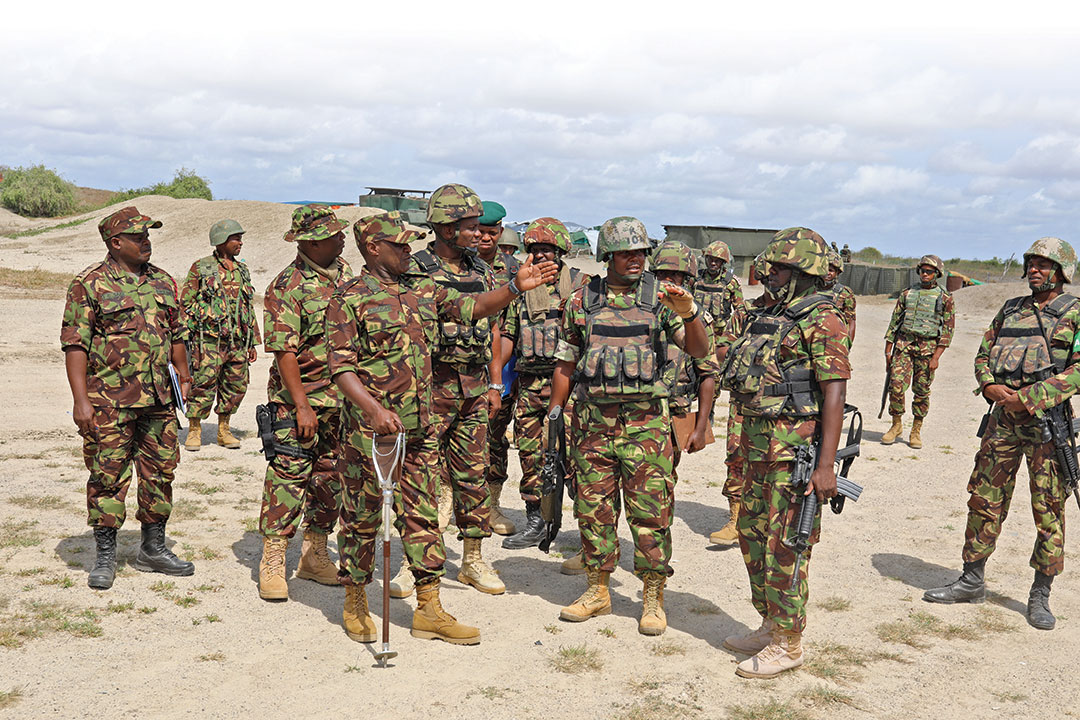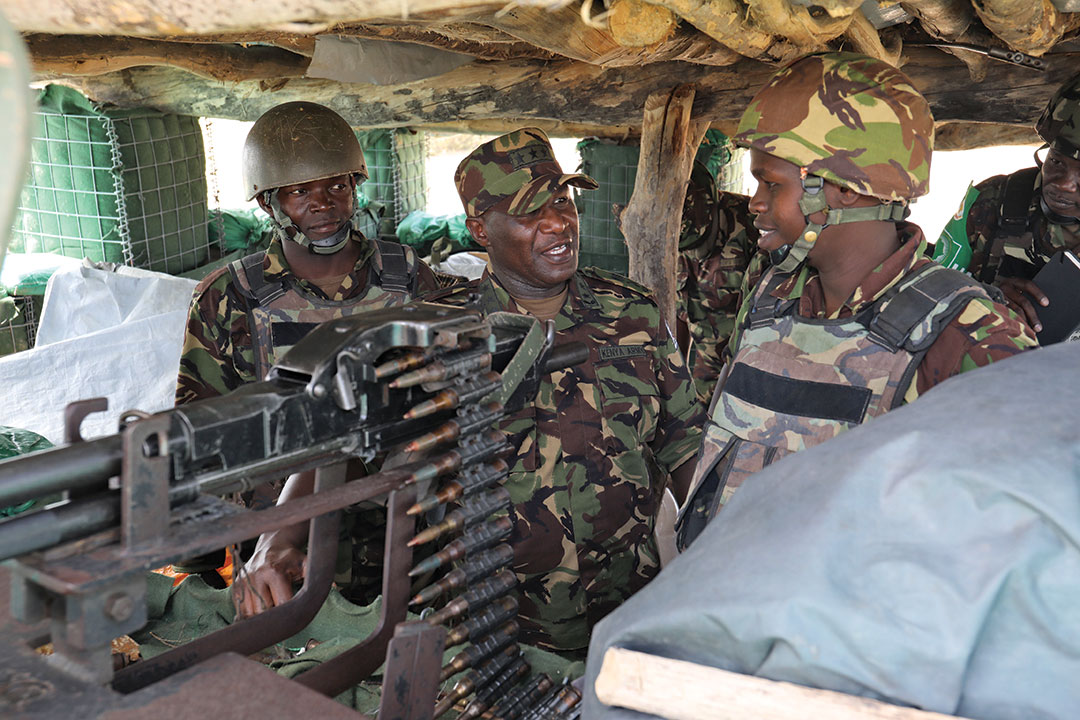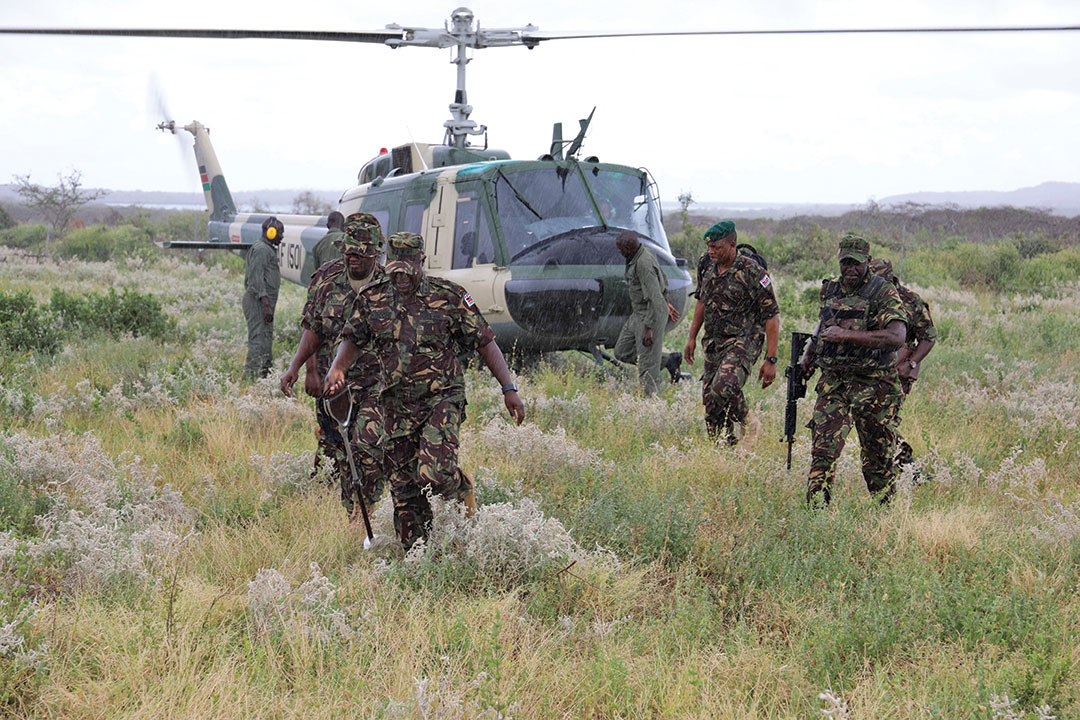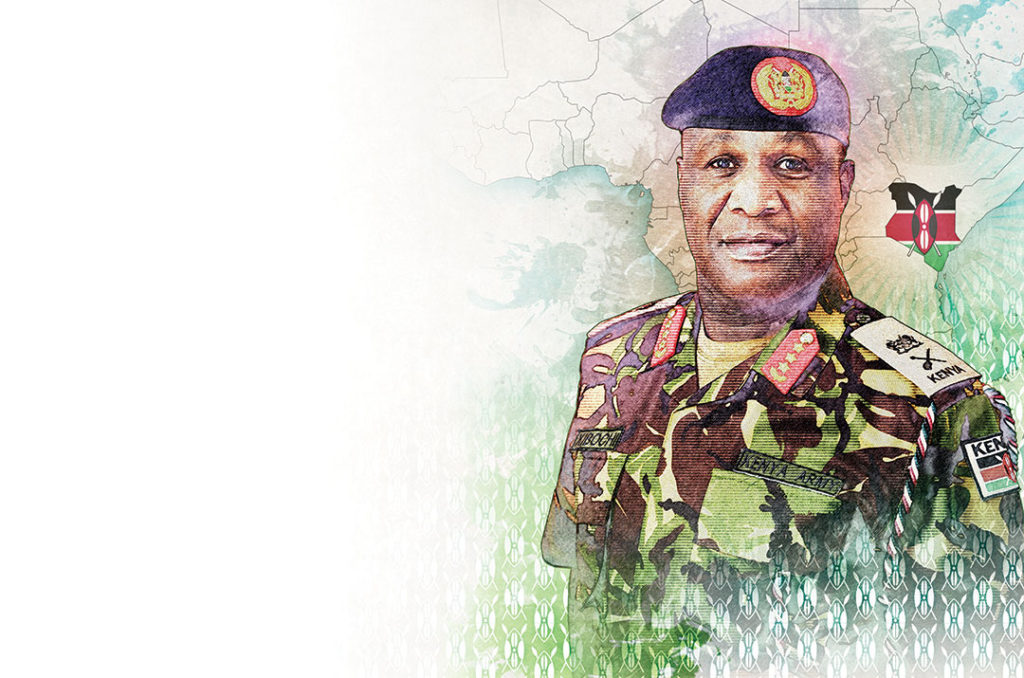Kenya’s Vice Chief of Defence Forces Looks to Finish the Mission in Somalia and Secure the Homeland
ADF Staff
Photos By Kenya Defence Forces
Lt. Gen. Robert Kibochi was appointed Kenya’s vice chief of Defence Forces in 2018. Previous posts during his 39-year military career include commander of the Kenya Army and assistant chief of Defence Forces in charge of operations, plans, doctrine and training. He commanded the Kenyan contingent in the United Nations Mission in Sierra Leone from 2000 to 2001. He holds master’s degrees in international studies and computer-based information systems and is pursuing a Ph.D. He spoke to ADF from his office in Nairobi. This interview has been edited to fit this format.
ADF: You’ve now been a part of the Kenya Defence Forces (KDF) for nearly four decades. What made you want to make a career in the military?
Lt. Gen. Kibochi: My interest in pursuing a military career can be traced from my high school days. I happened to have been in school in an area that was inhabited by the military, just next to Nakuru. This really, in the early days, got me very much interested to become like the Soldiers that I saw.
The Kenyan military institution has been, and continues to be, highly respected. I was very lucky to have been recruited in 1979, and upon training and getting to understand more of the mandate of the Army, I began to realize that serving in the Army was not just a career, it was an opportunity to contribute to the security of my country. I tend to think that that was a very wise decision. It is really the highest calling that one can have in a country.

ADF: In July 2018, after being named vice chief of Defence Forces, you visited Kenyan Soldiers serving in the African Union Mission in Somalia (AMISOM). What did you take away from this visit, and what is your assessment of the security situation in Somalia?
Lt. Gen. Kibochi: This particular visit in July was to assure continued support as I was transitioning to the new job and to really boost the Soldiers’ morale. Also, to enlighten the senior command of the reality on the ground. The Soldiers are really very keen to engage with the senior leadership on a number of issues that are very important.
On the question of the assessment of the security situation in Somalia: Our assessment is that the country is stabilizing following various successes of AMISOM troops, who are gaining ground in the majority of areas. We continue with our mandate to ensure that normalcy returns to the region. Most important, we would like to ensure that we safeguard the sovereignty of the Republic of Kenya as the guardians of the security of the people of the republic.
ADF: How do you define mission success in Somalia? In your opinion, when will it be time for Kenya to leave the country?
Lt. Gen. Kibochi: Mission success in Somalia can be defined as resumption of peace and stability under a Somali-led government. I think one of the key issues that was discussed during the strategic Concept of Operations (CONOPS) summit held at the African Union was the importance of supporting the Somali Transitional Plan. This CONOPS is designed to align itself to that particular transition plan, which goes up to 2021 as the timeline for AMISOM to leave Somalia. As a country we decided to be part of the multinational initiative called AMISOM under the African Union, and we will continue to be part of that effort until the transition –– aligning with the requirements of the Somali government –– is achieved. To bring security and stability to Somalia, the security forces must be organized, trained up, and equipped for them to eventually take over the roles and responsibilities that the KDF and AMISOM troops are undertaking in Somalia. Being a neighbor, we very much want to find a lasting solution to the stability of our eastern neighbor.
ADF: From Operation Linda Nchi in 2011 to the ongoing AMISOM mission, how has the engagement in Somalia changed the KDF? It has been one of the first missions for the KDF beyond its borders since independence. What have been the most important lessons learned?
Lt. Gen. Kibochi: While this was the first large-scale engagement for the KDF, it has always been a premier and mission-capable force. Operation Linda Nchi reinforced this capability. A number of lessons have been learned over time. We’ve been in Somalia now for close to six years, and this engagement has helped identify gaps in doctrine and equipment. These issues have been really helpful as we continue to modernize the force to respond to asymmetric threats. The KDF has also put an emphasis on issues touching on the welfare of Soldiers and their families. This includes support and recognition of our veterans who, really, we consider our heroes. We have emphasized the appropriate handling of those who have been left behind, and this has led to a very deliberate establishment of welfare centers across all our camps that are manned by professionals who address the concerns of the troops and their families. It is also important to note the 14th of October, the date Operation Linda Nchi was launched, has been recognized as KDF Day. We have been marking this day annually to honor the Soldiers’ legacy.
So yes, a number of lessons have come out: emphasis on doctrine, emphasis on training and, of course, appropriate combat assets to match the threat.

ADF: Kenya’s border with Somalia has been a source of instability. What strategies are being used to secure this border? It has been reported that Kenya is in the process of building a border fence.
Lt. Gen. Kibochi: The issue of border security is one that requires a multifaceted approach. Our border with Somalia is close to 700 kilometers from the north to the south, and it crosses all sorts of terrain — sometimes very hostile terrain. So, with the deployment of the KDF into Somalia, one of the objectives is to ensure that the threats emanating from across the border are degraded. I’m happy to report that has effectively been going on. Yes, we still have some work to do, but that has been going well. We have also realized a lesson that we need to establish a border security mechanism that is multiagency and that looks at, not just the security, but also the establishment of crossing points to be able to ensure that those who want to cross over in either direction are doing so in a structured manner. That is where the issue of the fence comes in to ensure that the crossing points are clearly identifiable and to also establish patrol corridors for troops and other security agencies. The other issue is the initiatives to support the local communities by providing socio-economic activities that focus on the people’s needs. Particularly those that touch on the development of water resources for their use and for their animals, the construction of road networks, and the issue of the freedom of movement across those areas. So it is a multifaceted approach that touches on many dimensions that all inform the border security. I think a lot has been done. I visited there recently and was very satisfied that this has helped to improve the security of the border towns.
ADF: From the Westgate Shopping Mall attack to the Garissa University attack, few countries have felt the impact of terrorism on their home soil as much as Kenya. How have these attacks changed the mission of the KDF? How has military training shifted to combat the asymmetric tactics used by these attackers?
Lt. Gen. Kibochi: Terrorism as we know it has proven to be a phenomenon that is not limited to a particular geographic region. Unfortunately, Kenya has also been a target of these attacks. The whole world is facing this generation of warfare. Like all other militaries, the KDF has adapted and acquired modern capabilities to effectively combat these threats. Kenya is engaged in a number of multiagency missions aimed at detecting, preventing and disrupting the aims of these terrorist groups. In terms of our ability to learn, yes we have. Has the mission changed for the KDF? No, the mission has not changed. The mission still remains the defense of the republic and its territorial integrity. But, the tactics have changed. And that has also resulted in a shift toward combat training for asymmetric tactics, which has therefore required that the force be structured to be able to respond to changes to the threat environment. There has been quite a lot of effort toward adapting to the new threats we face as a force.

ADF: Do you think the KDF has a role to play in counterradicalization of young people and preventing terrorist recruitment?
Lt. Gen. Kibochi: You cannot be able to argue that you are fighting terrorists in the field while the source of terrorism, which is radicalization, is not being addressed. So, within the context of Kenya’s Counter Terrorism Strategy, which is a multiagency approach, the KDF has a role to play. Do we take the lead in that effort? No, because there are agencies in that multiagency effort that will take the lead. Do we support the efforts? Absolutely, either through intelligence or through providing any support that is required within this multiagency configuration. It is important to highlight that this multiagency effort has seen a lot of success because we are dealing with these issues collectively and not in silos like in the past.
ADF: As you take on the new role of vice chief of Defence Forces, what are your primary goals? How do you plan to reform the KDF and prepare it to meet the security challenges of the 21st century?
Lt. Gen. Kibochi: I am the vice chief and, therefore, my primary goal is to support my chief of the Defence Forces in achievement of the KDF mission through exercising our core values. For the KDF in the field, because of the mutative nature of the threat, there is a requirement for us to continue to train our troops effectively. I will be supporting heavily on that front. There is also the question of upgrading our combat systems to make sure we are always mission-ready for the defense of the country. I see myself playing a very key role of supporting my chief in ensuring that we continue to improve on our ability to defeat the threat because that is critically important. We must continue to get the right training internally and with partners, like we do with the United States Army. We will continue to partner in those areas that are critical to sharpening our arrowhead, and our arrowhead is the troops who are fighting in Somalia and across the Kenyan borders.


1 Comment
congrats, he gves me the courage to continue striving hard to joining the military